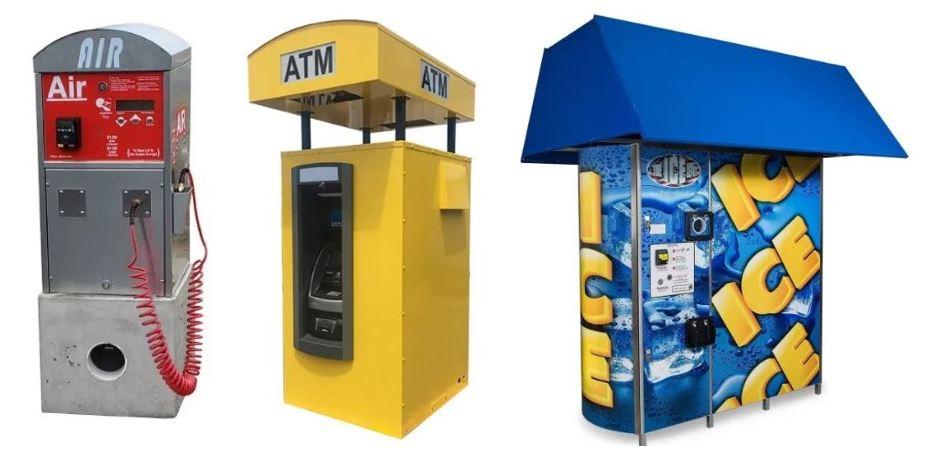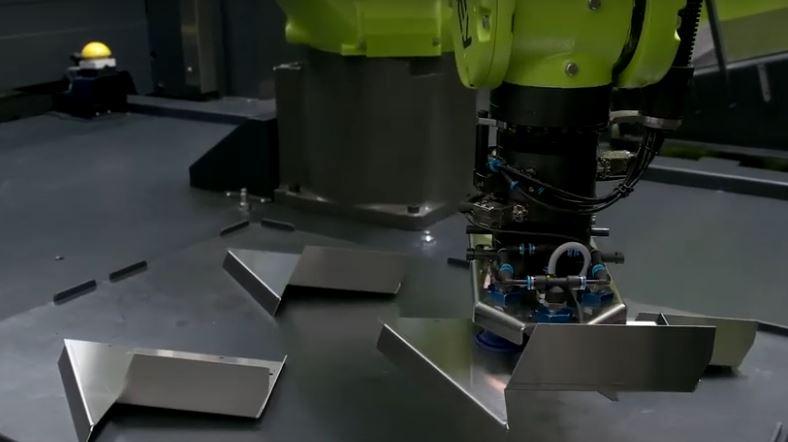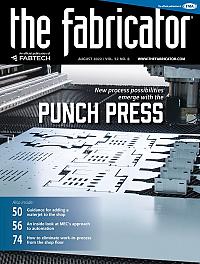Editor-in-Chief
- FMA
- The Fabricator
- FABTECH
- Canadian Metalworking
Categories
- Additive Manufacturing
- Aluminum Welding
- Arc Welding
- Assembly and Joining
- Automation and Robotics
- Bending and Forming
- Consumables
- Cutting and Weld Prep
- Electric Vehicles
- En Español
- Finishing
- Hydroforming
- Laser Cutting
- Laser Welding
- Machining
- Manufacturing Software
- Materials Handling
- Metals/Materials
- Oxyfuel Cutting
- Plasma Cutting
- Power Tools
- Punching and Other Holemaking
- Roll Forming
- Safety
- Sawing
- Shearing
- Shop Management
- Testing and Measuring
- Tube and Pipe Fabrication
- Tube and Pipe Production
- Waterjet Cutting
Industry Directory
Webcasts
Podcasts
FAB 40
Advertise
Subscribe
Account Login
Search
What one Texas metal fabricator learned about having a robotic bending cell
With the right talent and some patience, job shop TPI finds automated bending a good fit
- By Dan Davis
- August 11, 2022
- Article
- Automation and Robotics
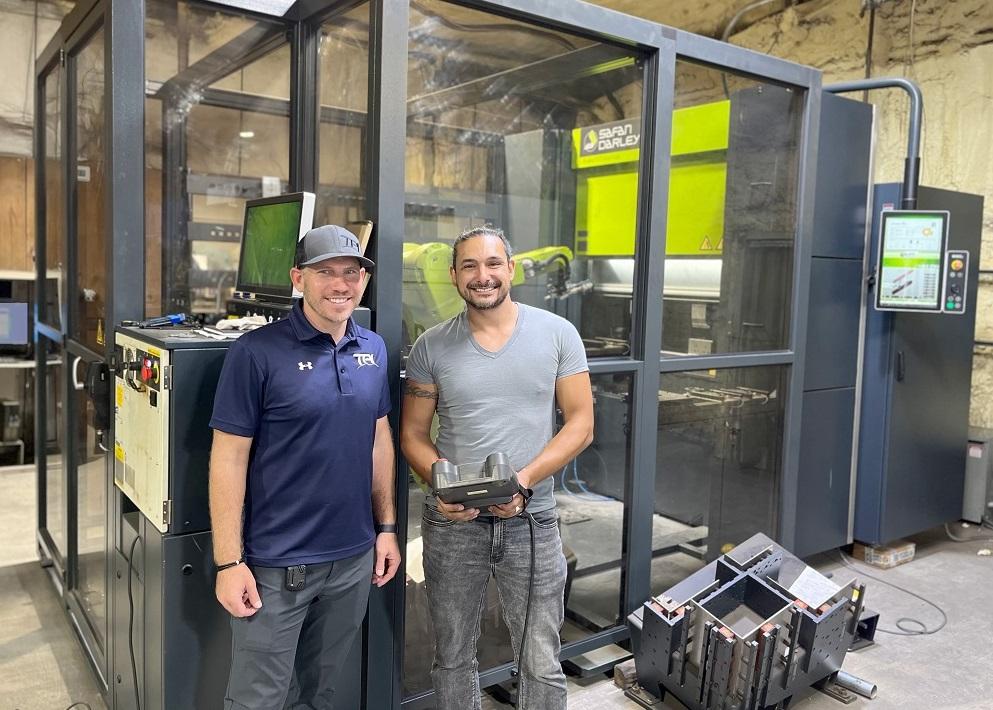
Bobby Silber, vice president of operations, and Mike Trevino, production manager, TPI, pose in front of the robotic bending cell. TPI
“Personnel’s probably been the biggest challenge. The work’s out there, but if you don’t have enough people, it’s hard to take on that extra work.”
That’s the viewpoint of Bobby Silber, vice president, operations, TPI, a metal fabricating company in Garland, Texas. He’s reflecting on the reality of his business, but he could be speaking for an entire industry. If shops lamented the fact that they couldn’t find skilled workers before the pandemic, they are struggling now given that businesses from the local coffee shop to multinational manufacturing companies are looking for anyone to fill open roles.
Fortunately, metal fabricators are in the problem-solving business, and Silber has taken steps to address this predicament as best as he can. One logical remedy, given the randomness of the work associated with the company’s job shop business, is cross-training. Most workers start off with the company in some basic assembly job, graduate into a more critical role, and then start to train on one of the company’s many pieces of CNC equipment.
“We’re always hiring versatile people, those that are willing to do more than one thing,” Silber said. That gives TPI, with about 90 employees, the flexibility to weather scheduled and unscheduled absences of employees and to schedule an additional shift on occasion if it needs to do large-scale jobs to meet critical deadlines.
It’s also started to invest in automation. About two years ago, TPI purchased a 6-kW TRUMPF 1030 solid-state laser cutting machine capable of cutting up to 1-in.-thick steel. More importantly, the laser came with an automated sheet loader and parts/skeleton unloader. TPI finally had the opportunity to run the laser cutting machine during off hours, allowing it to take on additional jobs without necessarily having to add people.
Solid-state laser cutting machines are very good at what they do—cutting lots and lots of parts. Like many other shops that shifted production pressures onto the bending department, TPI had a robust lineup of press brakes ranging in size from a 40-ton SafanDarley electric brake to a 230-ton Cincinnati hydraulic brake with a 12-ft. bed, but Silber said the time was right to invest in an automated bending cell. The investment was going to be part of the next big step in the company’s growth.
Answering the Call
TPI has undergone many timely transitions during its existence. The company, formerly known as Telecom Product Inc., began 30 years ago by refurbishing payphone enclosures for entrepreneurs that owned the payphones. As time went on, it began to manufacture the enclosures, pedestals, and other related parts, and with that expansion into full-blown fabricating came a slew of CNC machine tool investments.
The emergence of the mobile phone obviously indicated that the payphone’s days were numbered, so TPI expanded into related markets, such as coin-operated air, water, and vacuum machines. The products might have been new, but they were being operated by the same type of small business customers and found in the same convenience stores, gas stations, and car washes.
Silber joined the business started by his parents in 2006 and found he really enjoyed the variety found in each day at a metal fabricating shop. He spent time getting to know the shop floor and just how modern metal fabricating worked, helping in assembly and operating machines. He took that experience and moved into sales, where he noticed a trend occurring—the emergence of standalone ATMs.
“So, we kind of spun off what we were already doing and started doing a product line for ATMs as well,” Silber said. “That kind of opened up a whole new market, and I kind of ran with that.”
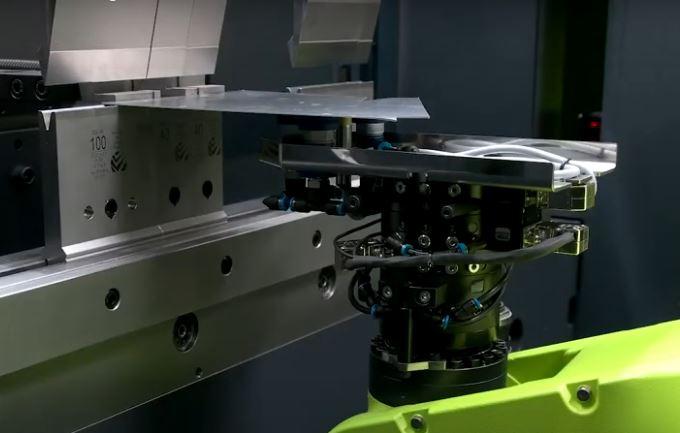
TPI’s SafanDarley Mini Cell, installed in mid-2021, has a robot capable of holding just over 25 lbs. SafanDarley
As TPI added new CNC equipment and manufacturing capacity over the years, it also decided to take on job shop work. They proved reliable as a metal fabricating supplier and often were rewarded with more work, including some large assembly jobs in recent years. Today the company’s business is almost evenly distributed over job shop work and its product lines for ATMs and coin-operated devices, with some months the random metal fabricating work reaching 60% and other months where the product line jobs dominate the production schedule at the same level.
“We’ve been able to stay pretty consistent. Each month will fluctuate, but one division will kind of pick up the slack for another, one month to the next,” Silber said.
The company’s 70,000-sq.-ft. campus has six buildings, all located near each other. Two buildings are dedicated to the assembly of TPI’s products and another to job shop assembly work. The other three buildings are dedicated to machining, punching, and other fabricating services, such as laser cutting, bending, welding, and powder coating.
Preparing for an Automated Future
When TPI was looking at automated bending, Silber was confident that he had the right pieces in place to make such an investment work. First, he had a robotics expert on staff, someone he had hired years previously with the knowledge that he was going to venture down this automation path. Second, TPI had purchased a robotic welding cell three years earlier, and after a slow start with that, his robotics expert and the welding support team now have the cell operating smoothly.
“There are a lot of challenges because it’s both robotics and fabricating equipment,” Silber said. “If you don’t have the right people, it might not be for you.”
With the right pieces in place and the proper experience, TPI felt comfortable in purchasing a SafanDarley Mini Cell from Capital Machine Technologies Inc. in Dallas. The Mini Cell, installed in mid-2021, comprises a 40-ton electric brake, an M-20iB25 FANUC robot capable of holding just over 25 lbs., and a protective enclosure surrounding the bending operation. The enclosure has enough room for four raw material stacks and a referencing table for the robotic arm. A small chute allows the robot to drop off parts into a bin outside of the enclosure.
TPI already had a 40-ton E-brake, so it was familiar with the machine’s touchscreen controls and AutoPOL programming software. All it really needed to do was just learn the robotics side of the Mini Cell.
Learning the robotic software was just part of the challenge, Silber said. The many variables in a bending cell—end-of-arm tooling, robotic arm movements, positioning of raw material, changing the robot’s grip during a bend, and placement of bent parts—are a lot to consider when creating bending jobs, even for someone experienced in robotics.
Silber said that TPI got up and running with the Mini Cell by the end of 2021, ironing out the kinks and finding the right work for the cell.
“I don’t think I could do a couple of these projects without it,” Silber said.
Of the five or so bending jobs that are regularly done in the automated bending cell, most are simple parts with fewer than four bends. Silber said, however, one part with six or eight bends also is sent to the cell because it’s reoccurring and small enough that it can be very challenging for even an experienced press brake operator.
Even with the somewhat lengthy learning curve, Silber said the robotic bending cell has helped TPI take on new work without overwhelming the company’s workforce. The large jobs, which make the most sense for the Mini Cell, could “bury” a typical job shop very easily, he added, putting not only one customer relationship in jeopardy, but others as well.
“You have to be really smart. You don’t ever want a customer that’s going to represent too much of your business—say 30%, 40%, or 50% of your revenue—when you take on that much work,” Silber said. “That’s where I think that this automation has allowed us to grow organically, kind of slowly.”
TPI has growth plans. There’s just no hurry.
Silber said that he might add another robotic welding cell before the end of the year. Another robotic bending cell might come later in 2023.
In the meantime, TPI is cognizant of what awaits it in the near term. New employees will be hard to find. The economy looks to be softening in the coming months, but TPI’s customers still will be demanding, as they are small entrepreneurs who can’t afford to wait around for a fabricated product to be sent to them.
Companies that purchase metal fabricating services from TPI also are likely to ask the metal fabricator to do more for them because they are satisfied with its current work. Automation will allow TPI the opportunity to say “yes” to some of those requests.
About the Author

Dan Davis
2135 Point Blvd.
Elgin, IL 60123
815-227-8281
Dan Davis is editor-in-chief of The Fabricator, the industry's most widely circulated metal fabricating magazine, and its sister publications, The Tube & Pipe Journal and The Welder. He has been with the publications since April 2002.
Related Companies
subscribe now

The Fabricator is North America's leading magazine for the metal forming and fabricating industry. The magazine delivers the news, technical articles, and case histories that enable fabricators to do their jobs more efficiently. The Fabricator has served the industry since 1970.
start your free subscription- Stay connected from anywhere

Easily access valuable industry resources now with full access to the digital edition of The Fabricator.

Easily access valuable industry resources now with full access to the digital edition of The Welder.

Easily access valuable industry resources now with full access to the digital edition of The Tube and Pipe Journal.
- Podcasting
- Podcast:
- The Fabricator Podcast
- Published:
- 04/16/2024
- Running Time:
- 63:29
In this episode of The Fabricator Podcast, Caleb Chamberlain, co-founder and CEO of OSH Cut, discusses his company’s...
- Trending Articles
How to set a press brake backgauge manually

Capturing, recording equipment inspection data for FMEA

Tips for creating sheet metal tubes with perforations

Are two heads better than one in fiber laser cutting?

Hypertherm Associates implements Rapyuta Robotics AMRs in warehouse

- Industry Events
16th Annual Safety Conference
- April 30 - May 1, 2024
- Elgin,
Pipe and Tube Conference
- May 21 - 22, 2024
- Omaha, NE
World-Class Roll Forming Workshop
- June 5 - 6, 2024
- Louisville, KY
Advanced Laser Application Workshop
- June 25 - 27, 2024
- Novi, MI
























